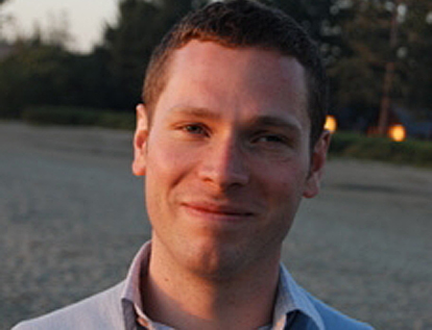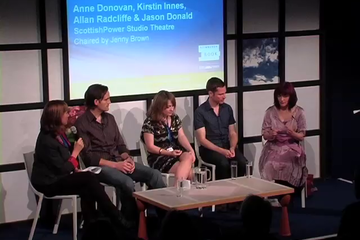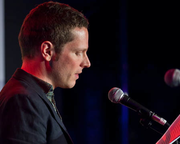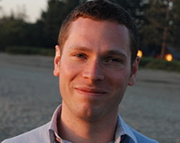Chicago
By Allan Radcliffe
We have commissioned a new piece of writing from fifty leading authors on the theme of 'Elsewhere' - read on for Allan Radcliffe's contribution.
It’s dark when we leave the bar. The rain has stopped and the air is hot and damp, garbage-sweet. Beneath the streetlights the sidewalk gleams yellow, the ground a mosaic of footprints.
‘You’re not with anyone?’ He has to shout over the traffic noise.
‘No,’ I say, too quickly. Close-up he looks younger than in the bar, maybe early twenties. His skin is beach-coloured, his cheeks and nose dotted with freckles. Dark eyes and thick, black eyebrows set strikingly low on his forehead giving his face a melancholy look even when he smiles.
‘Your name?’ His tone is clipped, like a teacher taking a register.
‘Alex.’
‘Al – ex.’ Then, almost as an afterthought, he taps his chest. ‘Tomas.’
We cross the river and swing between the traffic on Wacker Drive. The town is heating up. Tomas strides ahead. I have to jog to keep up with him. I ask him where he’s from. ‘Chile.’ He smiles at me expectantly and I try to dredge up everything I know about Chile, but all I can find are names: Allende. Neruda. Pinochet, for fuck’s sake.
‘And you? You are from Chicago?’
I blurt out a laugh. ‘No. Scotland –’ My voice rises to a question mark, but Tomas bobs his head emphatically. ‘Oh yes! I visited Scotland once with my family when I was fourteen. Edinburgh . . . Loch Ness . . . It’s beautiful.’
‘I’m from Glasgow –’
‘Ah yes, Glasgow. The plane landed there, I think.’
Tomas’s hotel overlooks the river. The name of the hotel is embroidered in silver letters across the front of a wide awning that extends all the way to the edge of the pavement.
In the bright foyer Tomas clicks across the polished floor and holds out his arm, palm up, smiling like an old friend. The man behind the desk bows his head as he holds out the key. As Tomas strides across to the lift, nodding at me to follow him, the receptionist catches my eye and holds my gaze, blank-faced, aloof.
Tomas’s room is at the end of a long, wide corridor. The door opens onto a narrower passage with closed doors on either side.
‘Washroom in here.’ He pushes at one of the doors and flicks on the light, waves his hand vaguely in the air. The tiles and tub are bathed in the same golden light as the hotel foyer. The bathroom is the size of my room at the hostel.
I follow him into the bedroom, transfixed by that bit of him where his long, brown neck meets the collar of his shirt. One end of the bedroom is all window: the glass is filled with smooth, black sky and the pointed upper reaches of the buildings opposite. The centre of the room is taken up with a king-size bed. Two framed photos stand on the bedside table: Tomas with loved ones, faces jostling for attention in their line-ups, effortlessly pushed into the background by Tomas’s lens-filling smile.
‘Drink?’ He drops to his haunches and scrutinises the minibar.
I slide apart the glass doors and step out onto the balcony. The airless heat pushes against me. So much for the Windy City. I look down and my stomach dips. The hotel and its neighbours converge so close to the river that the water makes a protective moat around us. Patient queues of cars edge over the bridges. The river is black, streaked silver. Across the water a train creeps towards the station. To my left, the traffic shoots frantically up and down the freeway. Chicago. I grip the railings, tip my head back, lean back, letting my heels take my weight, a smile stretching my face.
Tomas hands me a plastic cup of red wine and the rest of the small bottle. As he taps his glass against mine I accidentally let go a cackle of pleasure. He looks at me quizzically, touches my cheek with the back of his hand, opens it into a palm and lays it against my face and neck. He drops his hand and gives my shoulder a little squeeze, then takes a long pull of his drink, leans against the railing.
I sip my wine. ‘So what brought you to America?’ His eyes narrow. ‘The States, I mean –’
He sighs deeply as though it’s too boring to go into. ‘Oh, I have just finished my studies –’ He looks out at the city, his eyebrows knitting and unknitting. ‘I have the choice of going travelling or spending the whole summer working in a telecommunications company with my friends. My father gave me money to go travelling.’ He frowns. ‘I don’t think I can go back for a while.’
Tomas started his trip in California. I mention some places, but he just smiles at me indulgently and nods, non-committal. San Francisco? ‘Yes, it is a nice enough place – very beautiful, colourful houses.’ Los Angeles? ‘This is really a difficult town I think, very dirty. I was scared to go out at night.’ Las Vegas? ‘What can you do there apart from push money into machines?’
I think back to my long weekend in Vegas. There was a boxing match on, the town was heaving and the hotels on the Strip were all booked up. I ended up in a place miles from the centre called Relax Hotel, full of weekending families. The pool overflowed with children.
‘But the people are nice here, don’t you think? Friendly?’
He hesitates for a long moment. ‘Some of them.’
Then he lifts his head, steps forward and wraps my hand in his, says something that starts with, ‘I think we should –’ and leads me into the bedroom.
There’s no fuss with Tomas. He cups my face in his hands, pulling me towards him, so close I can see the thin, dark line of tomorrow’s stubble emerging around his chin and upper lip. There’s no give in his waist when I put my fingers there. Just hip bones jutting out, hard as handles. The skin on his hands and neck is soft and there’s a pleasant metallic taste on his tongue.
He pushes me gently onto the bed, arches over me and puts his hands on me, runs his fingers all the way from my cheek down to my waist, pulls me close, fits himself to me. By the time we’re lying kissing with our hands inside each other’s clothes I’ve settled on what I always do: improvise, act, pretend I’m someone else, a character in a film or from the television, someone who knows exactly what he’s doing.
Later, we lie side by side on the bed not saying much. I ask him if he’s all right and he smiles and nods. ‘Yes. Very.’ He yawns and unravels his long, lean body, turns his head towards me. The bed is so wide I have to stretch out my arm to touch my hand to his. Tomorrow a shyness will open up between us as we reach for our clothes, negotiate who’s going to use the bathroom first, attend to our hangovers, try not to notice each other’s imperfections.
*
I take him to a busy café near Grant Park, a grungy place. Tomas glances around warily, clutching his canvas messenger bag to his side. We sit on an ancient, threadbare sofa so low his chin’s just about resting on his knees. This makes us both laugh. I ask Tomas if he’s been out on the scene much in the States, and he just wrinkles his nose.
When the breakfast arrives we sit in silence, reading the different sections of a newspaper. Occasionally Tomas laughs or snorts and shakes his head and opens the paper to let me read whatever article he’s taking issue with. He laughs wildly at one in particular: Obama claiming the banking system is sound. As he reads down the page he wipes the tears from his eyes, like he’s watching a sitcom.
At some point his mobile buzzes and his face bursts alive. ‘My brother.’ He shakes his head, beaming, his smile widening as he scrolls through the text. ‘His daughter had her third birthday party.’ He laughs. ‘Can you believe it? Thirty other children and their families were there.’
He lays his phone on the table and gazes dreamily out of the window, his eyes narrowing at the sun, his face slowly sagging.
‘Have you just the one brother?’
‘Mmn? Oh no.’ He leans forward. ‘Two brothers and two sisters and me. Five.’ He taps his chest. ‘I’m in the middle.’ He counts off his siblings on spread fingers. ‘Boy, girl, boy, girl, boy. My father says we are like a seating arrangement at a wedding. Here.’ He thumbs the keys on his phone, hands it to me. ‘Look, here I am with my niece. Pilar.’
In the picture, Tomas is cradling the white-wrapped, sleepy-eyed newborn baby in his arms, laughing, open-mouthed.
‘She’s cute. Does she live in Santiago too?’
He stares at me. ‘She lives in my home. We all live together.’
‘You live with your brother?’
‘My brother lives in the family house with –’ He counts on his fingers again, ‘His wife and me and my parents and my little sister and my little brother . . . My older sister lives with her husband and family.’
‘In Santiago?’
‘Across the street.’ He tucks his phone in his pocket and shrugs. ‘This is normal for Chile.’
‘You must have a big house.’
‘Big enough for all of us. The servants also live in this house.’ He lowers his eyes, self-conscious suddenly. ‘Many houses have servants. They are like members of our family.’
He lifts his coffee. ‘And you? Tell me about your family.’
‘One brother, one sister. She’s in Italy. Tuscany. She teaches English there. He lives in New Zealand.’
He clatters his coffee cup into the saucer.
‘He works there.’ My voice comes out hushed, apologetic.
‘And your parents?’
‘I … one of each.’ I laugh weakly, but his face is wrinkled in confusion.
‘Your parents are alone then?’
‘I –’
I picture Mum and Dad sitting in their armchairs in the living room, smiling at something on the television, and a wave of sadness goes through me, a pressure building against the backs of my eyes and nose. They dropped me off at the airport three months ago. Dad kept asking if I was okay for money. ‘Remember to phone when you get there,’ Mum said repeatedly. ‘I’ll just feel so much better when I hear your voice.’ I didn’t get round to calling them until three days after I arrived. Mum was frosty when she answered. ‘You’re obviously having fun, then.’
Tomas stares at me, his brow grooved, like I’m a tricky clue in a crossword. I set my face, suddenly childishly angry. His eyes drop to the floor as if drawn to some fascinating detail on the carpet.
Out on the street Tomas looks at his watch and sucks at his teeth and frowns.
‘Well –’ He flattens his palm to his forehead, screens his eyes from the sun’s glare. He leans in my direction, as if about to follow me.
‘I’d better get to work.’
He shrugs. ‘Maybe I will see you later –’
‘I –’ I hesitate for a moment, unsure what to say. He’s surprised me. ‘Um . . .’
His eyes narrow further. He has long, stiff eyelashes like a girl.
‘Sure, why not?’
I write down the address of the pub I work at on the café receipt, and tell him to come at about six.
There’s a baseball game on. The regulars huddle around the television, the low chatter occasionally broken by cheers or defeated groans. In between serving drinks I clean and polish the bar, sweep the floor, wipe the bar stools and restock the fridges. I try not to watch the door.
Tomas arrives at quarter past. He looks too tall for the small, cosy pub. He walks straight over to the bar, smile slanting from cheekbone to jaw.
I tap my watch. ‘What time do you call this?’
‘I have to make myself look my best for you –’
‘If that’s your best –’ Emboldened, I aim an open-lipped kiss at his mouth. As I pull away, he laughs, almost involuntarily.
A groan from the television area: the Cubs are four-three down. Tomas stares into the corner with an expression of open-mouthed wonder on his face, an anthropologist who has just stumbled upon a hitherto undiscovered tribe. His eyes linger momentarily on the group in the corner, who are shaking their heads into their beers, and then he turns back, his eyebrows raised in wonder.
We take the bus back to the hostel so I can shower and change. Weary-eyed passengers sit or stand quietly, staring at the floor and the roof, just as they do on the underground in Glasgow. Rain drums against the window. Tomas complains loudly about the lack of decent weather in summer in Chicago, as though he’s been short-changed by the travel agent. People are turning to glare at him, but he rattles on, oblivious.
To distract him from the weather I tell him something I’ve been saving up, a story that has come back to me, about an exhibition I saw a few years back, photographs of Chilean refugees living in Scotland. Now I only remember images and half-stories, but I do remember one account quite clearly, that of a musician who was imprisoned and tortured in the National Stadium. This stuck in my head. It seemed so wrong that a sports stadium could be used in such a way.
And I’m telling him all this, and at the same time I can hear my voice getting faster, climbing up the scale. ‘It’s terrible,’ I keep saying to Tomas, ‘It’s just so . . . terrible.’
And I don’t know whether it’s because I’m talking too quickly or if the sound of the rain slapping the windows is making it hard for him to hear me, but he doesn’t really respond. He just smiles distractedly into my face as though he’s only half there.
My room at the hostel is narrow, barely a person’s width: a single bed with a roof over it. Tomas has to duck to get under the door. I watch him stepping gingerly over the debris of underwear and socks I left on the floor two nights ago. He sniffs the air, pulls aside the pale green curtains and opens the window. ‘For the fresh air,’ he murmurs, confronting me with wide, innocent eyes like a kid who has been caught doing something he shouldn’t have.
I go to the showers, and when I come back Tomas is stretched out on my bed, peering at the dog-eared copy of Kitty Kelley’s biography of Frank Sinatra I picked up in a hostel near the Grand Canyon. He’s about ten pages in. I sit down beside him with my towel wrapped around my waist and another towel round my shoulders and shake my wet hair all over him. He laughs and throws the book onto the floor, catches my hand.
We sit on the bed leaning against each other for a while. Tomas asks me if I think North American men are good-looking.
‘Their teeth are mostly very nice.’
‘You have many boyfriends here?’
‘No.’
‘You don’t have a boyfriend in Scotland?’ he says.
I shake my head, smiling, remembering the song my mum used to sing: I’ve a laddie in America and another in Dundee-aye-ee-aye-ee –
I squeeze his hand. ‘What about you? No boy back home?’
His grip loosens. ‘I had a boyfriend for a while when I was at the university. Victor. His name was Victor.’ He lowers his head, his mouth turning down at the corners. ‘But a friend of my family told my father. And my father was –’ he closes his eyes at the memory, ‘so angry.’
‘Oh, I’m . . . I’m sorry.’
He slowly shakes his head. ‘I don’t think my father will ever understand.’
We both stare down at our hands. I fail to think of something to say that won’t sound flippant or uncaring.
Tomas breaks the silence with a deep sigh, lifts his head, pushes his shoulders back and smiles at me.
‘So –’ he says, placing the flat of his palm on my chest and running it all the way down to my bare belly.
After a minute or two of kissing me on the mouth and all down my neck, he gently nudges me away, slides down his jeans and pulls his T-shirt over his head.
We’re both quite thin, but we struggle to fit comfortably into that narrow bed. We have to hold on to each other to stop one of us falling out. Laughing, we struggle to get comfortable, clinging on to each other like we’ve got one air supply between us and if we let go we’ll lose it.
Copyright © 2010, Allan Radcliffe. All rights reserved.
Supported through the Scottish Government’s Edinburgh Festivals Expo Fund.





 Major new partnership with Celtic Connections
Major new partnership with Celtic Connections 

